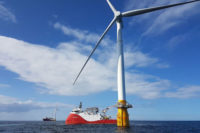Masschusetts officials have turned down an offshore wind energy project developer that sought revised power supply contract terms because its project was not financially viable due to rising costs.
In a Dec.16 filing to the Massachusetts Dept. of Public Utilities, Avangrid said unforeseen supply chain disruptions, inflation and high interest rates will not allow it to meet the state requirement that the contracts “facilitate financing” of the estimated $3.7-billion, 1.23-GW Commonwealth Wind offshore wind energy project off Massachusetts,
The developer had asked state regulators to dismiss its 20-year power purchase agreements (PPAs) with local electric utilities and allow the project to be rebid because current economic gyrations have upended its financing and construction under existing contract terms.
But in a Dec. 30 ruling, the state utility regulator approved the contracts as "in the public interest,” ruling that the project failed “to justify review of the PPAs.”
It also granted the utilities’ request to amend the Mayflower Wind PPAs, cutting the power price by 10% to “lessen the impacts on customer bills,” citing the 2022 lnflation Reduction Act that allows developers to claim a 30% investment tax credit for offshore wind projects.
Mayflower has declined to comment.
An Avangrid spokesman said the developer “continues to review the ... decision while assessing its legal options,” but also that it "will continue to work closely with our business, labor, industry, environmental and community partners ... "to ensure Commonwealth Wind can move forward.”
Sector participants and analysts speculated how the decision could affect economic development projects set to accompany the Commonwealth Wind, including a new subsea cable manufacturing plant in Somerset and upgrade of the Salem, Mass., waterfront for offshore wind support.
They also noted that future project bids and contract term flexibility on other pending East Coast projects would reflect current price risk trends.
Some state legislators have raised concerns over the impact that potential project defaults could have on market competition and investments in related manufacturing, as Gov. Maura Healey (D) earlier stated an intention to raise the state’s wind power goal to 11.2 GW from 5.6 GW.
'Could Not Have Been Predicted'
Avangrid secured the project contract award in December 2021 in its third offshore wind procurement round, and signed its PPAs in April. Since that time, "the global economy has changed both dramatically and swiftly in ways that could not have been managed or predicted by Commonwealth Wind,” Avangrid said.
It instead wanted the state to conduct "a robust fourth solicitation as soon as possible,” which Commonwealth Wind would bid into and offer a project with new pricing, the company said. The next solicitation must be issued by May 7.
The filing followed months of discussions with utilities and regulators, but “no realistic path to amending the PPAs has emerged,” the company said. “No interest is advanced by approving PPAs that cannot and will not lead to the development of offshore wind energy generation."
On Dec. 23, Mayflower Wind, a 400-MW project also set to be built off Massachusetts, filed a supporting motion with utility regulators but did not seek to terminate its own contracts. That project's developer, a Shell-Ocean Winds joint venture, said it "must nonetheless agree with much of the factual analysis underlying Commonwealth Wind’s conclusion” about project financial viability.
Mayflower's owners said the project will stay “consistent with the timelines" in its own PPAs, agreed to as long as three years ago in two project award rounds, but "the project and tax equity financing required for delivery ... along with the cost of such financing, has changed dramatically and unexpectedly as interest rates have risen sharply.”
Uneconomic
Avangrid cited "unprecedented" component cost hikes, as reflected in recent announcements from major turbine suppliers that–contrary to historic trends–prices for turbines "will rise significantly going forward,” according to the filing. The changes have dramatically upended the project’s cost assumptions, which rendered the PPAs uneconomic.
The filing referenced an S&P Global market report showing that turbine makers Siemens Gamesa and Nordex have raised prices to long-term highs, with the former's onshore wind machines up 41%.
Avangrid's request comes as the U.S. Interior Dept. issued its draft environmental review for Commonwealth Wind and a sister project, the 804-MW Park City Wind project that is set to serve Connecticut.
As a new industry, offshore wind "is not immune to the impacts of global economic trends," Josh Kaplowitz, head of the American Clean Power Association’s offshore wind unit told industry publication Recharge. But he noted that because projects have no fuel component, once built, they will be "a buffer against price fluctuations. Wind resources are immune from inflation.”
Kaplowitz also said lengthy offshore wind project development spans and current economic gyrations make permitting reform critical.
NJ Ratepayer Watchdog Advises Caution
The Commonwealth Wind pushback comes as New Jersey’s monitor for ratepayers warned state regulators to reduce the pace of its offshore wind project buildup, due to higher cost risks.
Brian Lipman, director of the Division of Rate Counsel, an independent agency, told the state Board of Public Utilities on Dec.13 that economic uncertainties could also affect the stability of its signed wind power PPAs. He said officials should consider scaling back a planned third solicitation planned for the first quarter for more project development and devising contract terms to address requested price adjustments.
Gov. Phil Murphy in September expanded New Jersey's offshore wind energy goal from 7,5 GW by 2035 to 11 GW by 2040. The next solicitation was said to seek between 1.2 GW and 4 GW in new offshore generation capacity.
Doug O’Malley, director of Environment New Jersey and an offshore wind proponent, told NJ Spotlight that long-term infrastructure projects face such financial challenges. "Supply chain challenges won’t last forever,’’ he said.
"The last three months of 2022 (Q4) are notable for the first-ever federal offshore wind auction along the U.S. west coast and key port investments," says the Business Network for Offshore Wind in its latest quarterly report issued in january, "yet the combination of supply chain bottlenecks, rising commodity prices, and the lack of coordinated transmission planning threatens to stall progress in 2023."







Post a comment to this article
Report Abusive Comment